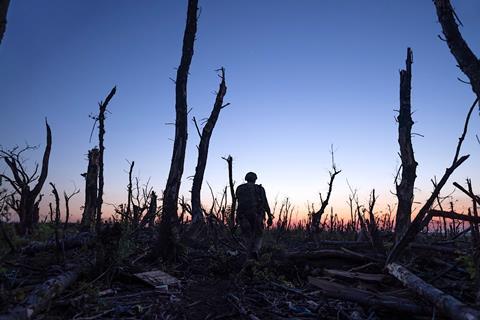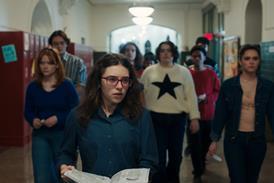Mstyslav Chernov follows up ’20 Days In Mariupol’ with a brutal missive from Ukraine’s front line

Dir: Mstyslav Chernov. Ukraine. 2025. 107mins
A distance of 2000m doesn’t sound like a lot. It can be driven in two minutes, run in ten and, if war is on your mind, a mortar can cross it in just 35 seconds. Yet that sense of proximity, like much in Mstyslav Chernov’s sobering documentary, is shown to be deceptive when the Russians occupying the village of Andriivka are armed to the teeth and a Ukrainian battalion is making slow progress – and sustaining heavy losses – while trying to mount an offensive. Chernov propels us straight to the frontline as the troops engage in brutal and deadly skirmishes in a more than three-month bid to liberate the territory.
A fearless piece of filmmaking in the face of danger
As with his previous Oscar-winner 20 Days In Mariupol, this is a fearless piece of filmmaking in the face of danger as Chernov, who acts as his own cinematographer with additional help from Alex Babenko, ventures into the sharp end of the conflict with soldiers from the 3rd Assault Brigade. 2000 Meters To Andriivka will, like 20 Days In Mariupol, be released by Frontline PBS in the US, and its timely nature and Chernov’s established reputation for reportage means other territories are likely to follow suit.
It’s September 2023 and Ukraine has begun a counteroffensive near Bakhmut, in the east of the country, where Andriivka has strategic importance. The brigade is tasked with bringing a flag to a unit sergeant, Fedya, who will fly it in Andriivka to show the battle is won. The only way for troops to approach the village is via a strip of forest, which itself is emblematic of the state of the war. The word ‘forest’ suggests a green haven, however this narrow and sketchy strip of stricken trees is anything but. Trunks stripped of branches and leaves are all that’s left as the troops scramble over bracken and hide in foxholes, while dodging grenades, suicide drones and shelling. Andriivka is also a bombed-out shadow of its former self, razed by the Russians. “It’s like landing on a planet where everything is trying to kill you,” we’re told.
The film is visceral and immersive as it follows troops who fire expletives as quickly as bullets as they try to make progress. Chernov’s footage is expertly edited by Michelle Mizner and mixed with images shot by the troops via their helmet cameras, which almost gives portions of the film the feel of a first-person shoot ‘em up – but this is no game and lives are being lost forever. In one of the most horrifying moments we are plunged inside an armoured medevac ambulance as it gets stuck in the mud before following the troops as they try to make it to safety on foot. Sam Slater’s rumbling score adds to the bleakness, occasional vocalisations rising from its electro and percussive heart like a lament.
Periodic bursts of news reports clue us in to the state of the counteroffensive, which is not going well, although no political framework is added; Chernov’s film is all about the immediate physical reality of war, not what is being said about it. As with his previous film, the director also offers sporadic sombre narration, often focusing on an individual soldier’s life story in the film’s quieter moments. Some of these young men prove to be the masters of understatement: “It’s a little bit chaotic here,” one notes. Others discuss the virtues of roll-up cigarettes or talk of beginning from scratch in places like Andriivka to build a better country.
Having learned about these men, we are frequently told they will die in battle in the coming months. In such close proximity to their life stories and philosophies, the loss feels even more acute. Later the film pulls back from the thick of battle to show the equally intense fight those at home are waging with grief, the ambient sound cut away as we watch crowds dominated by women and children laying their loved ones to rest.
Chernov brings home the sense of violent stalemate so that, even when Andriivka seems within reach, peace still feels a long way off. Considering the conflict, he says, “The longer it goes on, the less the world will care about it.” He is certainly doing everything he can to make sure we keep paying attention.
Production companies: Frontline, AP
International sales: Dogwoof, Cleo Verger cleo@dogwoof.com
Producers: Mstyslav Chernov, Michelle Mizner, Raney Aronson-Rath
Cinematography: Mystyslav Chernov (additional cinematography Alex Babenko)
Editing: Michelle Mizner
Music: Sam Slater























